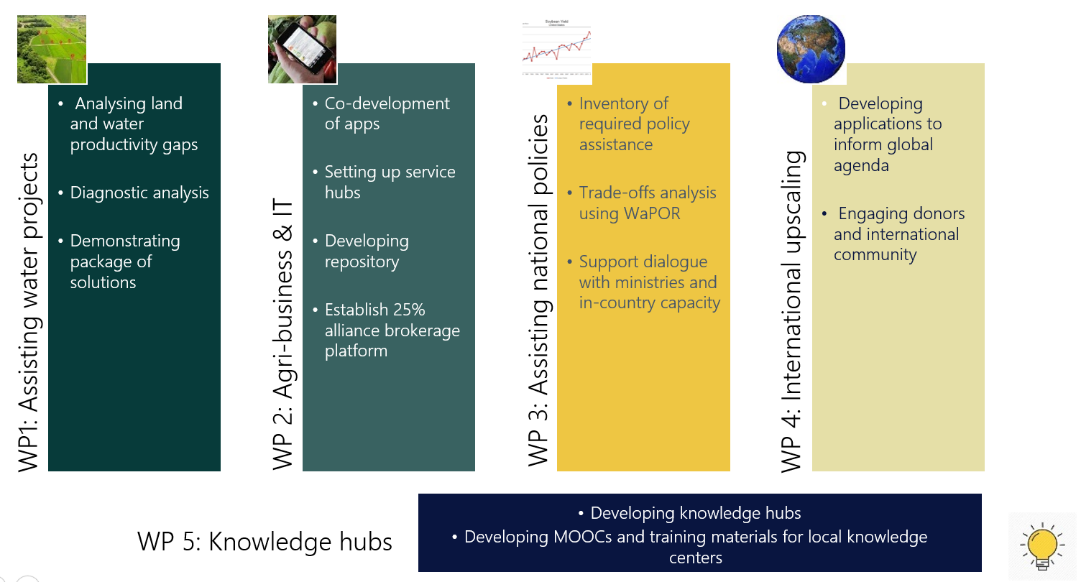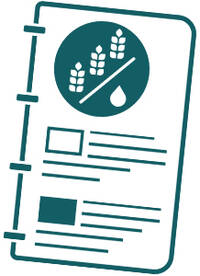Water Productivity Improvement in Practice (first two phases) (2018-2022)
The first two phases of the WaterPIP project were organised into 5 distinct but interconnected work packages:

Key outcomes
During the first two phases of the WaterPIP project several resources were created to better understand the different dimensions of water productivity, the diffferent ways remote sensing data (WaPOR) has already been used for water productivity assessments and other applications and provide a comprehensive repository of interventions that can improve water productivity:
Learn more about Water Productivity Improvement in Practice in our MOOC


FInd out more on how WaPOR has been used for various purposes in our WaterPIP repository
You can find more on different ways to improve water productivity here. This repository provides details of 62 interventions for improving water productivity among other aspects, which is partly based on the compendium of solutions developed by the WaterPIP project.

×
Work Package 2: Agri-business & IT
Work Package 2 (WP2) aims at providing services to promote and facilitate improving water productivity. It involves connecting with small and medium-sized enterprises, non-governmental organisations, and agri-businesses, and engage them in putting water productivity into practice. Farmers, suppliers, financers, processing industries, public sector, and information technology (IT) companies need to collaborate to develop solutions to improve water productivity.
The objective of WP2 is to:
- Identify local use cases and engage with, and support (potential) WaPOR users through local service centers (engage)
- Improve access to and interpretation/analysis/usage of WaPOR data and information by (co-)developing applications (develop)
- Share, demonstrate and showcase water productivity tools through a repository and country based water productivity events (demonstrate)
See activities and outputs from WP2
×
Work Package 3: Assisting national policies
In Work Package 3 (WP3), the WaterPIP team will focus their efforts on assisting national policies in Egypt, Jordan, Ethiopia, Kenya, and Sudan. This assistance will be delivered through policy dialogues. Many valuable opinions and insights will exist on how to be more productive with water regions in a particular region. A policy dialogue is then useful to get a deeper understanding of current and alternative policy directions. The dialogue should move beyond mere water productivity (for instance crops per drops as pure policy objective), as in reality many more factors will play a role in decision-making processes on new policies for water management, such as employment generation, energy blending targets, poverty alleviation, food sovereignty, environment.
See activities and outputs from WP3
×
Work Package 4: International upscaling
Work Package 4 (WP4) aims at increasing the engagement of governments, donors and funders to put improving water productivity higher on the global agenda. Technical and communication material will be developed building on WaPOR applications and case studies developed by WP1-3. WP4 communicates how water productivity improvement goes beyond biophysical improvement and links to socio-economic dimensions. It makes explicit the trade-offs intrinsic to various kinds of decision-making and priority setting related to agriculture and water management. In order to strengthen the link with the international agenda (Sustainable Development Goals (SDGs) and other relevant reporting frameworks), WP4 focuses on repackaging the case studies and tools developed in other work packages to support reporting on SDG 6.4, to which FAO is custodian agency, as well as other internationally relevant themes such as drought and dryland farming.
See activities and outputs from WP4
×
Work Package 5: Knowledge hubs
Work Package 5 (WP5) aims at setting up knowledge hubs in target countries to uptake training activities and support on WP, develop a MOOC on water productivity, and to integrate water productivity related topics in research projects and curriculums run by academia in target countries. WP5 aims to increase the reach of the water productivity based assessments by developing knowledge hubs, specialized curriculums, a MOOC, and training materials in partnership with academic institutes in the south and will include additional uptake activities to disseminate the developed materials.
See activities and outputs from WP5





